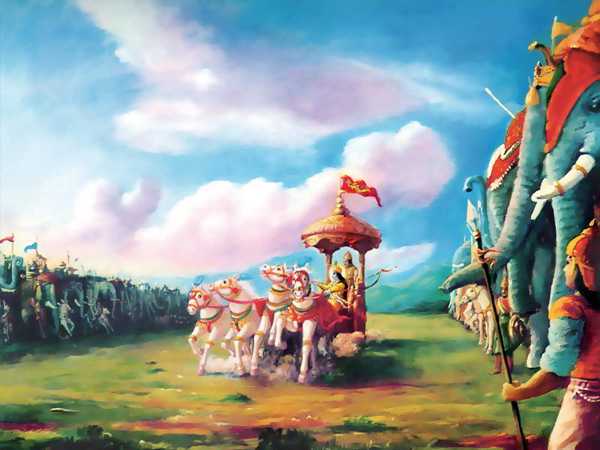Chapter 18

“Salya said, “Then Indra, glorified by the bands of Gandharvas andcelestial nymphs, mounted on Airavata, the king of elephants,characterised by auspicious marks. And the illustrious Agni, and thegreat saint Vrihaspati, and Yama, and Varuna, and Kuvera, the lord ofriches, accompanied him. And the lord Sakra, the slayer of Vritra, thenwent to the three worlds surrounded by the gods together with theGandharvas and the celestial nymphs. And the performer of a hundredsacrifices, the king of the deities, was thus united with his queen. Andhe began to protect the worlds with exceeding gladness. Then theillustrious divine saint Angiras arrived in the assembly of Indra andworshipped him duly by reciting the hymns of the Atharva. And the greatlord Indra became satisfied and granted a boon to the Atharvangiras. AndIndra said, ‘Thou wilt be known as a Rishi of the name Atharvangiras inthe Atharva Veda, and thou wilt also get a share in sacrifices.’ Andhaving honoured Atharvangiras thus, the great lord Indra, the performerof a hundred sacrifices, parted with him, O great king. And he honouredall the deities and all the saints endued with wealth of asceticism. And,O king, Indra, well-pleased, governed the people virtuously. Thus wasmisery endured by Indra with his wife. And with the view of slaying hisfoes, even he had to pass a period in concealment. Thou shouldst not takeit to heart that thou, O king of kings, hast suffered with Draupadi asalso with thy high-minded brothers in the great forest. O king of kings,O descendant of Bharata, O delighter of Kuru’s race, thou wilt get backthy kingdom in the same way as Indra got his, after having killed Vritra.The vicious Nahusha, that enemy of Brahmanas, of evil mind, wasoverthrown by the curse of Agastya, and reduced to nothing for endlessyears. Similarly, O slayer of foes, thy enemies, Karna and Duryodhana andothers of vicious souls will quickly be destroyed. Then, O hero, thouwilt enjoy the whole of this earth, as far as the sea, with thy brothersand this Draupadi. This story of the victory of Indra, equal to the Vedain its sacred character, should be listened to by a king desirous ofvictory and when his forces have been arrayed in order of battle.Therefore, O best of victors, I am reciting it to thee for thy victory, OYudhishthira. High-souled persons attain prosperity when they areglorified. O Yudhishthira, the destruction of high-souled Kshatriyas isat hand by reason of the crimes of Duryodhana, and through the might alsoof Bhima and Arjuna. He who readeth this story of Indra’s victory with aheart full of religious faith, is cleansed of his sins, attaineth aregion of bliss, and obtaineth joy both in this world and in the next. Hehath no fear of his foes; he never becometh a sonless man, neverencountereth any peril whatever, and enjoyeth long life. Everywherevictory declareth for him, and he knoweth not what defeat is.’
“Vaisampayana continued, ‘O best of Bharata’s race, the king, that bestof righteous men, thus encouraged by Salya, honoured him in proper form.And Yudhishthira, the son of Kunti, of powerful arms, having beard thewords of Salya, spoke to the king of the Madras the following words,’There is no doubt that thou wilt act as the charioteer of Karna. Thoumust damp the spirits of Karna then by recounting the praises of Arjuna.’
“Salya said, ‘Let it be so. I shall do just as thou tellest me. And Ishall do for thee anything else that I may be able to do.’
“Vaisampayana continued, ‘Then Salya, the king of the Madras, badefarewell to the sons of Kunti. And that handsome man then went with hisarmy to Duryodhana, O repressor of foes.'”




